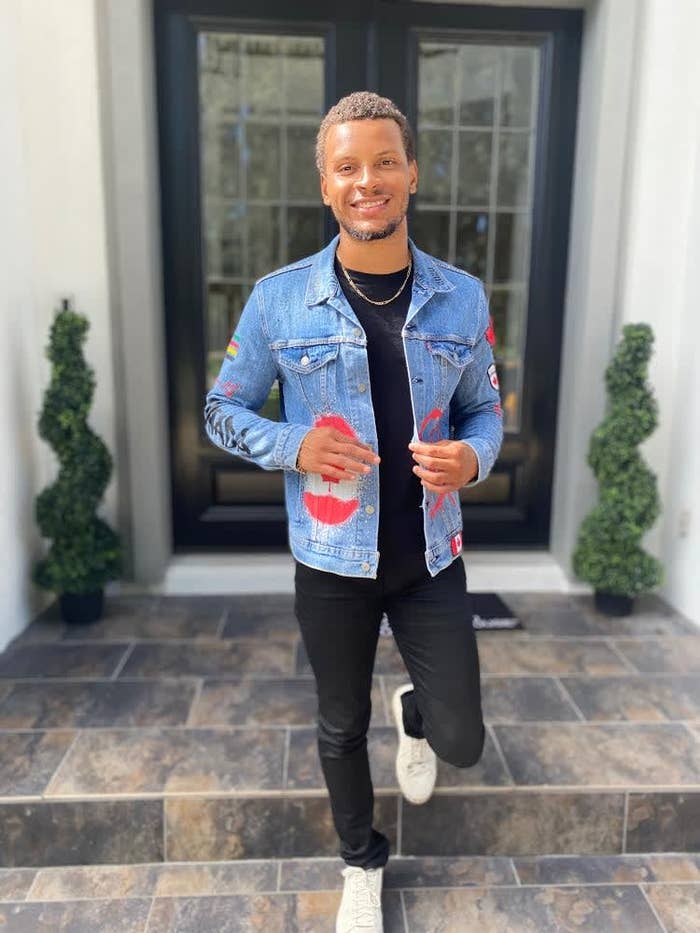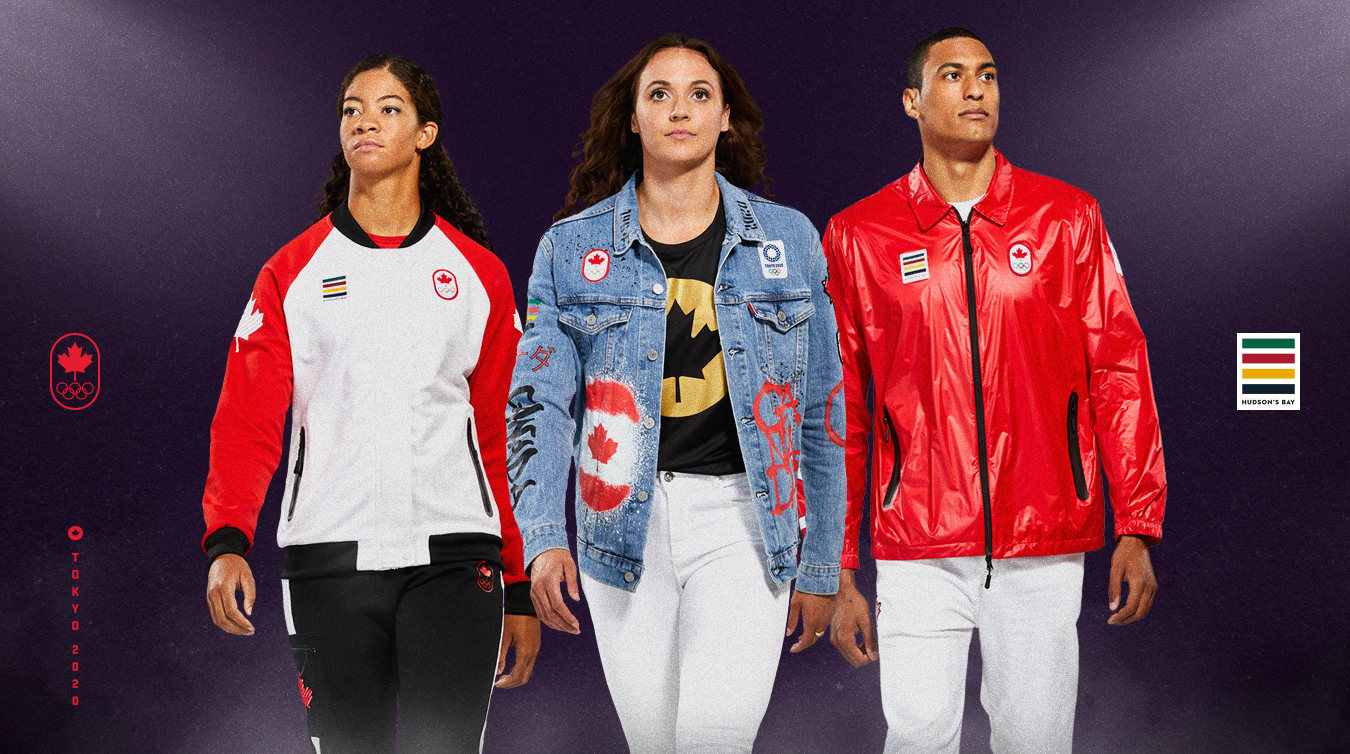If you think the COVID-19 pandemic messed with your recent plans, consider how it upended the summer schedule of those elite-level athletes preparing to compete at the 2021 Olympic Games in Tokyo. That’s a lot of wasted squats...
For 25-year-old Puma-sponsored sprinter Andre De Grasse, the postponement of Tokyo’s big moment has necessitated a creative training regimen and an even more tenacious attitude than regularly required to be one of the fastest humans on the planet. And presumably lots of squats.
This week, Team Canada unveiled the official outfits they'll wear at next year's Tokyo games. Complex Canada's Alex Narvaez caught up with De Grasse to talk about what it’s like to race in a stadium with zero fans, how he plans on holding his speed until 2021, why he ran his first race in Converse Jordans, and the wavy new Team Canada Collection from Hudson's Bay.
Tell me what it’s been like these last few months.
Yeah man, it's been crazy. From the start of the pandemic, I went from training six days a week, getting ready for the Olympic Games, which only come around once every four years. So it's a big highlight for me and all of a sudden everything just crashed. And now we're in a pandemic and I've got to figure out what's going on with my kids. Like, you know, getting them to go to school or daycare and then trying to figure out my training. Just like just life in general. It was like a roller coaster. My coach tried to do everything that we could to try to use other facilities or grass fields anywhere that we could just to train and still stay fit. Because when we found out the news for that, the Olympics were going to be postponed, I didn't want to lose fitness. I didn't want to be, you know, on the couch, junk food and all that. I still want to continue to keep training, some way somehow. Definitely that was a huge adjustment.
What was Markham like growing up?
I was born in Scarborough. I lived there for the first eight years of my childhood. Things were different. In Scarborough at the time, I was around just one race, but when I got to Markham it was so multicultural, it felt like every single race was there. So it was pretty awesome to grow up in that environment.
I heard for your first race you were wearing Converse Jordans.
Yeah, exactly. That's what I was wearing. At the time I didn't have no attire, no track stuff. So that's where it all started for me in Markham...everyone always thinks that I started track at an early age, but I grew up playing in Markham soccer, basketball, baseball... and then eventually I got into track and field.
That's amazing hearing you speak about Markham because, fast forward to today and you have a street named after you there.
I know, it's crazy because in Markham that area wasn't even developed yet. There was nothing there, but land... I didn't get a chance to hang out there as much because they didn't start building it up until later on in high school going into college, but, you know, we'd go out there and we'd hang out, go to the movie theaters. There were a lot of restaurants over there. And all of a sudden the mayor just surprises me on that day I came back from the Olympics...he's like, "We're naming a street after you." It made me tear up a little bit.

I’ve heard you speak about how track saved your life, about how you were running with a rough crowd. What was that part of your life like?
For myself, growing up, there were only two ways to make it to the top or you'd sink to the bottom. At that time, in my high school career I was playing basketball, but basketball wasn't going really that good for me anymore, so maybe I just got caught up a little bit going towards the wrong direction. My grades started slipping a little bit. College wasn't really on the table for me. I wasn't sure what I wanted to do after basketball was over. So I think my track gave me that opportunity again to tell myself, "Yeah, I'm good at sports."
I'm an intelligent young student. I can put into work. I just had to really get my mind back focused, to tell myself, "Alright, I can do these things, I can make it happen." And I think that's where my coach Tony Sharpe came in and was a great mentor, a great role model for me. It was cool to have him in my corner, backing me. He was like, "You could take this far, you can go far with this, this could be your way out." So I just took that opportunity, I got a scholarship to go off to the middle of nowhere, Kansas, this little small town called Coffeyville. I was like, let me get out of Markham, let me get out of the city, try something new. That was just icing on the cake for me. Once I got to that level, I never looked back. Track created so many opportunities for me: I ended up getting my degree, I'm a professional athlete, I'm one of the fastest in the world. It worked out, so I was pretty happy about that.
Talk to me about 2015. I feel like 2015 was really a breakout year for you. What would you say in your mind really solidified you as like an Olympian?
Well, I won the NCAAs, the championship in Oregon. So I think that gave me a lot of confidence moving forward. Coming home to the Pan American games, that kind of solidified it for me, that I was able to handle all that pressure. It was tough because I'm like, "man, I gotta run the 100, 200, 4X100 relay," and I was just thinking to myself, take one race at a time. Definitely the home crowd was great, it was just electrifying, the atmosphere was amazing, but also I felt that pressure down my neck. If I don't deliver, I feel like I'm going to let my family and my friends down. So I just wanted to do my best, made sure I stayed focused. I got the job done. I was confident and my coach gave me a lot of great advice. He was like, "you can do this here, you're faster than anyone here, you just have to put it all together, make sure you focus on getting out the blocks, keep your technique, and you'll win the race." So I basically just tried to put all the pieces together, and once I won the 100, I was like, "oh, I'm going to win the 200, too." That's how confident I was moving forward. Everybody cheering me on gave me the extra push, the extra motivation, so I was just super confident at that moment in my career.
Also in 2015 you signed your massive Puma deal. $11.25 million, a massive figure. What does that do to a young kid? I heard you went out and bought a Honda Accord… What were some other things you splurged on at that time?
I bought some designer stuff in the beginning. Like some Gucci, you know what I'm saying? All those types of things, some jewelry, but I really just tried to keep a low profile, keep it cool, not spend too much, just try to keep myself level headed, be responsible. And as time goes on and I keep getting better, eventually I'm going to buy some things. Like recently, after three years of being a professional, I finally just bought my first house.
Let’s talk about social distancing racing. What’s it like racing without a stadium full of people cheering?
It was weird. I was warming up and I was like, "Man, how am I going to get pumped right now?" Because, literally, it's no fans. But I remember last year we were in Doha at the world championship and they had this crazy lighting show where it made all this noise and your name would pop up on the lane of the track, and it would just be electrifying. I think we could do something like that.

You post a lot of #site on social media. It means “speak it to existence,” right? What does that mean to you?
Yeah, I don’t know. I always try to tell people that actions speak louder than words. “Speak it to existence”—just keep saying it until it happens… My friends were like, "You should put it on your shirt," so we ended up making a couple of shirts... I asked my sponsor Puma to put it on the back of a couple of my shirts. It was awesome... I ended up running with it.
Do you want your daughter to become an athlete as well?
We talked about it, but for us it doesn't matter. I know that the expectations would be really high of her because I'm an Olympic medalist and my girlfriend is an Olympic medalist as well... so it'd just be super high expectations... As long as she grows up to do something that she loves, she's passionate about and that fulfills her and makes her happy. We're cool with anything. It doesn't even have to be sports.
Let’s talk about the 2020 Olympics, which were pushed to 2021. Usain Bolt is retired. It seemed like this was going to be a big year for you and now you’ve got to wait. How do you feel about this?
Yeah, I felt like I was so ready. When the pandemic hit, we were about five months away from the games. I was in great shape. I felt like I was ready. But now I'm like, "okay, well now you're looking at a different way. It's another to get better, another year to keep progressing and maturing and getting better as a person and as an athlete.”
What about this fly jacket you’re wearing? This is the new Team Canada piece?
Yeah, this is the Hudson Bay collection. Shout out to them. You can get it at TheBay.com or in stores. I got the jacket a couple of weeks ago and this is the jacket that they were telling us that we were supposed to wear in the closing ceremony this year. And I was thinking to myself when I saw the picture, 'Man, it's going to be hot,' but it's actually pretty lightweight. It's a lightweight denim jacket. It feels pretty good. I'm inside my house right now, I don't even have the AC on and I don't really feel hot, and I live in Florida, it's humid as well… It's a cool jacket and definitely something that I would rock outside of the Olympics just to show my Canadian pride, maybe on Canada day, those types of situations.

